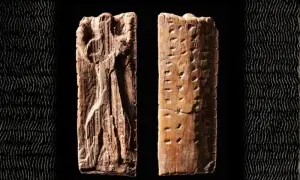To behold a Zia Mohyeddin shahbash
3 min readThe worst came to pass: I forgot my lines on the opening night of King Lear. I recovered composure in a few seconds, got back on track, and seemingly sailed through the rest of the performance. But I knew: From the back of his seat in the theater, I knew Zia sahib had seen me flounder.
As soon as the performance ended, I called him. It was 11pm.
To my surprise, he picked up. “Jee?”
“Zia sahib. I’m so sorry…”
“It’s late. We shall talk tomorrow.” He hung up.
I had let Zia sahib down. Zia sahib, who worshipped at the altar of Perfection. I couldn’t sleep all night.
I raced to his NAPA office the next morning to formally apologise. “I’m so, so sorry,” I said, now crying.
He sighed, plucked a tissue from his desk, and handed it to me.
“Let us rehearse.”
I mopped up. We rehearsed.
“Off you go.”
Off I went. I didn’t mess up again. The weight of my distress at letting him down was directionally proportional to the magnitude of my adoration for him.
He had a particular way of saying “shahbash.”
Not shah-baash, or shabash, but shab-sh.
Shab-sh. Shab-sh. Shab-sh.
As his student, you rarely heard it.
But when you did, your heart bloomed and you contemplated a jump from the highest building at the maniacal joy of having received a compliment from Zia Mohyeddin.
I took myself to his mandir because I wanted to break myself down. I wanted to examine and discard the rotten tics I had picked up from television. I wanted to strip away my inhibitions, and, from a painful proximity, experience someone scowl at my incompetence. Oh to be scowled at in a world of masks…
It wasn’t easy working with Zia sahib—but that’s the thing with actors: we want to please…
And so it began.
An audition—a successful one (shab-sh!)—followed by three months of rehearsal.
Zia sahib’s ear was alert to every micro inflection, every twist of a less-than-perfect pronunciation. He once called me “Ahl-e-Punjab” on account of my Punjabi pronunciation. He made me say “gaya” (went) twenty times. “What is this gyaaa? gyaaa! gyaaa! It is guh-Yaa!” He would not let anything go.
And he always arrived before his students.
I was once five minutes late to rehearsal.
“Mira,” he said, beckoning me after it ended. “You were late today.”
“Sorry, sir.”
“In my book 4 is not 1-minute-past-4.”
“Understood. Sorry, sir.”
We began rehearsing. We got into it. We stood and delivered on our lines and scowled and gritted our teeth and intoned from the depths of our bellies.
He watched from his position. He lit a cigarette.
Every now and then, when he offered a joke, we swarmed to his chair. He spoke softly.
Zia sahib was moved by Art. He wasn’t particularly moved by people. (Unless that person was a vessel for the Art.)
When I heard the news of his passing, I felt a deep thud in my chest. I was so lucky to have been taught by him. So grateful to Naveed Riaz, his nephew, for alerting me to the King Lear audition. I condoled with his family and went about my day. Later in the afternoon, I checked social media to find it lit up with tributes to Zia sahib. I watched a clip of him reciting Noon Meem’s Rashid’s poetry.
I had seen him recite the poem at Ali Auditorium through the 2000s as I went every year with my grandparents.
“Zindagi se darte ho? Zindagi to Tum bhi ho. Zindagi tou hum bhi hain…”
For the latest news, follow us on Twitter @Aaj_Urdu. We are also on Facebook, Instagram and YouTube.


























Comments are closed on this story.